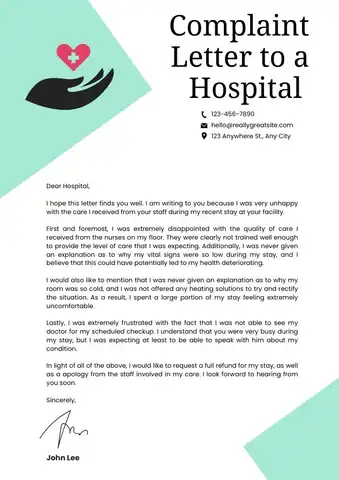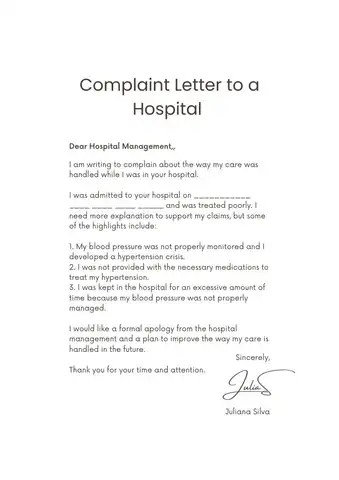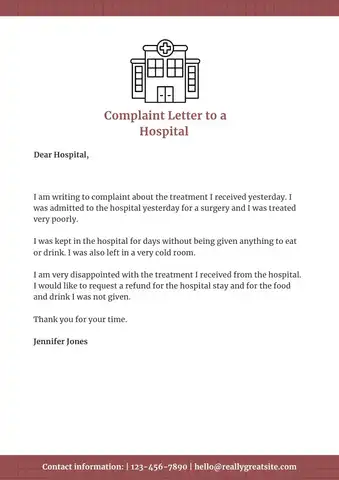A complaint letter to a hospital is a formal letter sent to express dissatisfaction with the hospital’s services. This letter is typically used when a patient feels that their treatment was not up to par or when they feel that their rights were not respected.
Table of Contents
How to write Complaint Letter to a Hospital

Complaint Letter to a Hospital
If you’ve had a negative experience at the hospital, writing a complaint letter to a hospital can be a useful way to get your point of view across. Follow these tips to make sure that your letter is effective and persuasive.
Identify the issue
When writing a complaint letter, it is important to be as clear as possible about the problem you are experiencing. Make sure to specify the incident’s date, time, and place. If you were not present for the event, be as descriptive as possible in your letter.
State your case
If you have had a negative experience at the hospital, writing a complaint letter can be useful to get your point of view across. Complaining about the treatment that you received can help to improve future experiences, and it can also help to ensure that your health and safety are protected.
To be effective, your complaint letter must be well-written and persuasive. Make sure to identify the issue you experienced, state your case clearly and concisely, provide backup arguments if necessary, and seal your letter with a heartfelt message. Finally, send your letter!
Prepare your backup arguments.
If you’re writing a complaint letter to a hospital, it’s important to have backup arguments. This way, you can prove your case when the hospital representatives ask for documentation or specific details about your experience. Make sure to have everything you need ― even if it’s not required by law.
One way to think of backup arguments is as evidence that supports your case. This evidence can come in letters from friends or family members, pictures from the hospital or medical records, or anything else that can help explain why you believe your situation was wrong. Read Also: 20+ Great Consumer Complaint Letter
Remember: The more evidence you have, the better your chances of getting what you want from the hospital. And remember: Don’t be afraid to use strong language when necessary to make your point. It’s always better to be upfront and explanatory with the hospital staff.
Seal the letter with a heartfelt message
When you write a complaint letter to a hospital, it’s important to stay respectful and polite. Be sure to include your contact information to continue the discussion if necessary. However, don’t overstay your welcome – keep your letter concise and to the point. This will make it easier for the hospital staff to understand and address your concerns.
Another important factor is to be clear about your case. Make sure to list why you believe the hospital has made a mistake. Also, provide supporting evidence, such as screenshots or documents. This will help prove your case and help the hospital resolve the issue quickly.
Finally, always remember to thank the hospital for their time and effort. A heartfelt message will show that you’re sincere in your complaint and appreciate the hospital’s effort to resolve the issue.
Send it off!
When you write a complaint letter to the hospital, remember to keep a positive attitude and seal it with a heartfelt message. Ensure you have all the necessary information, including evidence to support your claims, before writing.
Address the hospital’s concerns head-on, and don’t let them intimidate you. Include a follow-up plan so that you can be sure your voice is heard. And finally, remember that a complaint letter isn’t just about getting your point of view across – it’s also about strengthening relationships between patients and hospitals. So send it off with confidence!
Complaint Letter to a Hospital

Complaint Letter to a Hospital Sample

Example of Complaint Letter to a Hospital
In conclusion After reading this article, you will better understand how to write a complaint letter to the hospital. Complaining is never easy, but it can help address issues you may have experienced. By following these tips, you can ensure that your letter is effective and persuasive.
Thank you for taking the time to read this article. We hope that it has been informative and helpful. Please do not hesitate to contact us if you have any questions or want advice on writing a complaint letter.
We look forward to hearing from you soon

